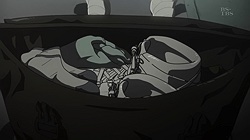 |
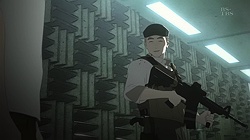 |
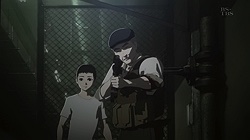 |
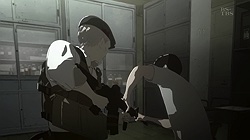 |
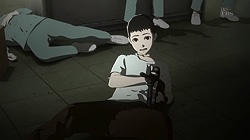 |
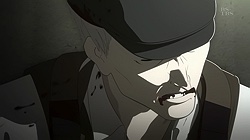 |
 |
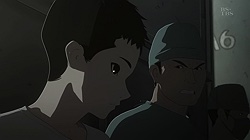 |
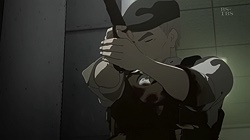 |
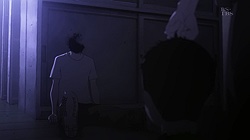 |
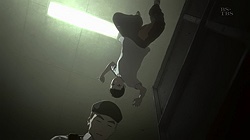 |
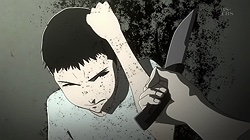 |
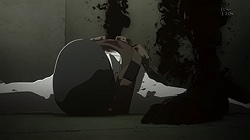 |
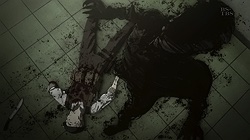 |
 |
 |
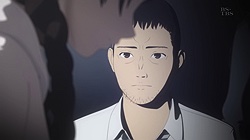 |
 |
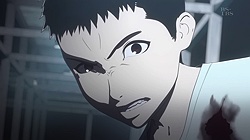 |
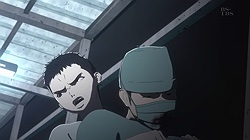 |
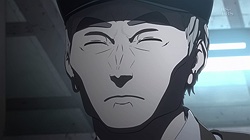 |
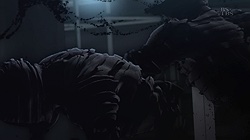 |
 |
 |
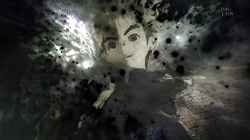 |
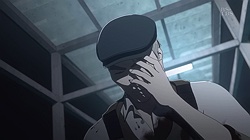 |
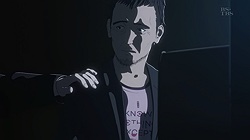 |
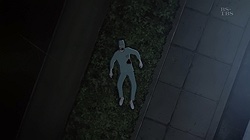 |
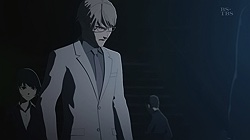 |
 |
「君もブチ殺してやる」 (Kimi mo Buchi Koroshiteyaru)
“How to Kill an Ajin”
Well, that all just got a lot more complicated.
No question about it, Ajin has completely found its stride – and what a stride it is. In terms of pacing this show is about as good as any we’ve seen in a good while. In fact a an action-thriller the last four episodes anyway have been just about flawless – exciting, tense, relentless, smart, intriguing. And the thing about a Polygon show is that you do sort of get dulled to how unnatural the characters look after a while – especially when the content is as riveting as it is with Ajin.
Drip by drip, the truth is coming out. – though the finish line keeps moving further and further away as it does. Why doesn’t Satou dispose of this “project” when he deems it a failure? Because Kei intrigues him – there’s something odd about the kid, though just how odd isn’t made clear until later in the episode. Satou doesn’t seem to be a complete psychotic – he did let Eriko live, though that might have been just to avoid risking alienating Kei – but he certainly thinks nothing of killing anyone who might stand in his way. That includes the “researchers” he and Kei cross paths with as they’re escaping the compound.
I confess it – I’m not quite sure what’s going on with Kei. He says himself that he never feels anything for anyone but himself, and seems genuinely puzzled when one of the researchers he saves from Satou tries to help him. Yet try and save those men Kei did, at considerable risk to himself – those men who’d spent the last several day torturing him gruesomely. Why would he do that if he were incapable of empathy – if he were the cold and logical automaton his sister says he is? What I’d thought was developing into a straightforward struggle of Kei to maintain his humanity even in the face of relentless cruelty is apparently something quite different – though just what that is I’m not sure yet.
Maybe I’m looking at this too straight-on, but I do see a contradiction between the Kei Eriko (and Kei himself) describes, and the boy we’ve been watching for six episodes. But one thing’s for sure – as human or as Ajin, Kei isn’t normal. Even Satou is struck by the oddity of Kei’s black ghost, which seems to be composed of a larger amount of IBM than normal. And he seems genuinely incapable of leaving the researcher who tried to help him behind, while at the same time genuinely dismayed that the man is still alive – almost as if helping him is literally a compulsion.
The risk to Kei here is very genuine, because Ajin can die, as Satou reveals – if they regenerate without being able to access the head, a new head grows in its place (which leaves us with all sorts of philosophical questions about identity). Ogura spills a few more tidbits too (to the discomfort of his American handlers) like the fact that the black ghosts are apparently transparent (thought not 100% of the time) and that the Ajin’s ability to generate nutrients is somehow key to their regenerative ability.
There’s a lot to take in this week, as Ajin seems to have taken a rather unexpected turn – but then, what’s a good roller-coaster ride without a few unexpected turns? “Never a dull moment” is a turn of phrase that may as well have been invented for this show, because Ajin just doesn’t waste a moment of your attention – there’s always something happening, and always something to think about.
Preview
 |
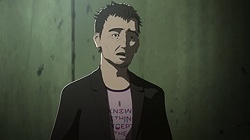 |
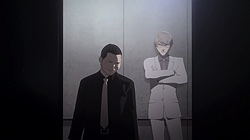 |

I actually feel that a huge part of Ajin’s charm comes from the CGI. Unless it came with a OPM or Haikyuu level animation, I feel all the black ghosts would have come off as ‘meh’ in fight scenes. The CGI also fits well with the dull color palette that Ajin suits.
Yes, CGI sometimes comes off as lacking when we’re talking about facial expressions or blood splatter but this is the best product we’ll get without a significant budget increase.
At this point, for me, the CGI shouldn’t really be an issue. Viewers should’ve made their peace with it one way or another. I disliked it at first, but now I don’t even notice it.
Totally agree with you on Kei. Was baffled at his portrayal only to turn around and save those doctors like he did. I mean even in the most practical sense, these guys were torturing and killing him (even if one doctor turned out to be a decent person), and the guy who is helping him get away from this horror should be the last person he decides to question on what feels like a spur of the moment moralizing.
Speaking of Satou, he just should’ve left Kei there knowing they’d just subdue him again and continue torturing him, which would play into his plans, but of course, we wouldn’t have the episode play out like it did.
Darn, just who the heck is Kei. That guy is a total being with no sense of empathy or whatsoever. I feel his actions are more dictated due to his depth of gratitude than his own will (or altruism).
PS: I am so loving this show.
My guess is that despite of lacking any kind of empathy, Kai has developed moral principles which govern his course of action. Ironically it’s his lack of feeling which allows him to rescue the researchers. Most other people had killed the researchers out of revenge before Satou had done it.
Speaking of Satou: he is a very convincing character, whose actions are governed by a realistic mix of reason and emotion.
Kei went back because saving a living human in danger was ‘the right thing to do’. There was no empathy or thankfulness. Kei wants to simply live the live of a human who does exactly what he’s expected to do. A model citizen I’d say. Fate was not kind enough to let him have a ‘normal’ life.
That is also why he easily agreed not to meet Kai when his mother asked him to. It was ‘the right decision’ to not get involved with someone with a questionable background.
You think it was the “right decision” not to continue to be friends with Kai because of his “questionable background”, a background that he had no control over? Way to be judgmental.
I guess maybe Kai shouldn’t have helped Kei, being of a “questionable background” and all.
It’s like what I said below. Kei wants an ordinary life. He will have it at all costs. Associating with a pariah makes you pariah. So he chose not to, as it would destroy the ordinary life he desires. Morality and emotion played no role in Kei’s decision to abandon Kai. He made a cool, rational, ruthless decision to stop associating with Kai the pariah in order to not become a pariah himself and maintain an ordinary life, as a sociopathic CEO might make cool, rational but decidedly immoral decisions for the sake of making money.
That does not make it the “right decision” was my point. Unless the quotations were meant to imply irony, but then there should be more quotations, like on “questionable background”, since Kai’s background is beyond his control (judging him on his father’s sins), even though he’s shown to be a decent, honorable friend.
I don’t think there’s anything “cool” or “rational” about it. You probably meant “cold and calculating”. Sociopathic CEOs don’t seem like they’re trying to be cold and calculating (or even cool and rational), some just seem like abusive egotistical assholes that don’t care and make decisions solely based on money, but still want to think they’re decent people (some probably don’t even care about that last part), and those are two vastly different things. I’d be more inclined to understand a cold and calculating CEO since their motives are more logic based, not ego based or money driven (which is not necessarily logic based and vice versa).
Wasn’t supporting the guy above. I don’t in fact think it’s the “right thing to do” or whatever. I disagree with him as much as you do. Was presenting my point in juxtaposition against his. “Rational” versus “calculating,” that’s just semantics, it’s the same difference, think of the phrase “rational calculus.” The word “rational” by itself is often used to describe unemotional decision making. Like how “sociopathy” and “psychopathy” are often (correctly) used interchangeably although some experts distinguish the two words.
Oh, I assumed you were replying to me, since you ahem, replied to me. Anyway…
As I understand it, and I am certainly no expert, “sociopathy” and “psychopathy” are two very different things. It’s used interchangeably a lot more than it should.
Rational and calculating differ in tone and meaning. Being rational, although it might mean being emotionless or detached to a degree, doesn’t necessarily mean that one is cold while making a decision, you adhere to logic, as opposed to calculating, which has a tone of being conniving (I don’t really agree with that myself), and it may or may not be logical. In fact, looking it up shows it to be “acting in a scheming and ruthlessly determined way.” as opposed to rational “based on or in accordance with reason or logic.”
Anyhow, I understand what you were getting at in your original comment though.
Should’ve made it clear who I was replying to, my bad.
*Shrug* Definitions of words, especially those used to describe complex concepts such as these, are never cut and dried- in spite of what Merriam-Webster would like you to believe. They’re often used in a variety of vaguely asymptotically appropriate contexts, and misused until the inappropriate becomes appropriate by convention. Words are imprecise instruments, which is a large part why discussions are so important- to tease out the deeper intended meaning of initially vague statements…
meant to reply up here…
While true to an extent, the words “rational” and “calculating” still hold different connotations as I mentioned. They’re usually not used interchangeably, and if so are done incorrectly.
Sure, but this is a colloquial forum, it’s hardly necessary to be sticklers for definitions. If there’s anything that’s not clear, we can just clarify it through discussion. Really man, I don’t want to spend the time proofreading and making sure every word I use is precise when I’m writing out three to seven minute pop-comments. I;m not writing a research paper here or something…
While true, that I wouldn’t want there to be anyone who’s a crazy nazi about language, and I believe in its fluidity as opposed to rigidity, I think in this case, these words have clear differentiations that most people adhere to when using them. I guess this is a case where we can agree to disagree.
See, I’m not sure I agree with you that it’s possible to be emotional and also perfectly rational. I think the essence of rationality is utilitarianism, and the perfect utilitarian in my mind is one who selects not only his means in terms of pure logic, but also his ends. Choosing ends that are realistically viable, not in accordance to whatever unrealistic things that you might feel like you want, and choosing the most expedient means to achieve them, without compromising efficiency because of emotional aversion- pure, logical decision making. Of course, like the expert in Psychology Today trying to sell his own brand of a distinction between “psychopathy” and “sociopathy” my own conception of the terms “rational” and “calculated” as highly similar is equally individualized and self-absorbed. But I maintain, as he does, that mine is a useful way to conceive of these terms. I guess, like you said, we just have to agree to disagree…
I think it’s natural to have emotion in rationality (unless you’re a robot or a psychopath). The difference is being able to set it aside and still make the rational choice (compartmentalization), hence the opposite of those who are ruled by emotion. But even those who are highly rational still have to struggle to maintain the divide with varying degrees of success. It’s certainly not easy, as we’re all only human.
And that gets to the gist of why I think it’s hihgly likely that Kei is Ajin’s author’s idealized “normal.” Because he always seeks “moral” ends through the most efficeint means possible. Without the “inner struggle” that you describe, which all normal individuals experience.
It should be noted that Ajin’s original scenario writer left the project after the first volume and the artist took over both roles himself.
This, I wager, is why there is a disconnect between Kei appearing at first to be, as Enzo put it, “an ordinary boy trying to maintain his humanity in the face of boundless cruelty” and the strange, slightly inhuman being without any capacity for empathy that the present arc portrays him as.
It seems to me like “maintaining humanity” was what the original writer was going for- until the artist took over the writing and decided that this was boring, writing subsequent chapters that cast doubt upon the genuineness of Kei’s initial appearance of humanity, eventually culminating in the laboratory arc which says outright that Kei lacks certain essential characteristics of being “human.”
This isn’t something I came up with after I found out the original writer only wrote the first volume. After reading Ajin’s first 4 volumes or so I got a gut feeling that something was extremely uncanny about Kei’s character development: his initial humanity seemed too genuinely portrayed for the later reveal of his underlying lack of empathy to make sense. So I googled the series and sure enough, I saw that bit about the original writer leaving- and I instantly understood why the “reveal” (read: really a forced shift) in Kei’s character felt so jarring and uncanny.
As for the issue of who Kei really is in this arc and beyond? Well he’s basically the artist-writer’s idealized “normal.”
Show Spoiler ▼
Basically the cold, rational, ruthlessness of clinical psychopaths like Emperor Nero, with zero empathy and no sense of connection or concern for others, that’s Kei. Except he does it in pursuit of an ordinary life and ordinary comforts- rather than decadence, debauchery and absolute power in Nero’s case, or some random modern CEO.
It leads to some surprising outcomes in terms of Kei’s decision making processes. As his interests are thoroughly in line with those of ordinary humans, and because the optimal means for disparate parties who pursue the same ends to attain those ends often converge (such as how the general normative foundations of human society are means for attaining the end of ordinary human happiness that have been optimized over thousands of years of live experimentation; they are often the best known, tried and true way to attain this goal) Kei is frequently, if not always, an ally of humanity. Even if only begrudgingly so. Essentially, one whose personality is heavily peppered with psychopathic traits but is still “good.” That’s who Kei is…
Did I say “good?” To clarify, what I meant by that was “compatible with and intergrable into human society, in spite of having many psychopathic traits.”
This feels much more symptomatic of Kei, someone with psychopathic tendencies, lack of emotion and empathy, as opposed to a sociopathic CEO, who certainly lacks empathy, but not emotion.
A large proportion of psychological disorders fall on a spectrum. Experts agree that this applies to psychopathy too. There is no one singular fixed set of litmus test criteria, for which you need to meet every condition, to be declared a clinical psychopath. Instead there is a large superset of criteria, divided by many experts into primary (heritable) and secondary (acquired) psychopathic traits, of which if you meet enough of to get a certain score on an expert-conducted test, you will receive a diagnosis of “psychopathic.” In other words, people need not have the same symptoms to be classified as psychopathic, they just need to have enough of the symptoms falling within the psychopathic cluster. Few real world clinical psychopaths are of the Hollywood cookie cutter variety, and I would wager that by and large most real world psychopathic persons exhibit peculiar, individualized sets of symptoms/psychopathic traits resulting in bizarre and unique psychological makeups when examined up close- much like Kei. I would not be surprised if the least if there is a real world psychopathic CEO with a similar set of symptoms to what Kei has, i.e. blunted emotions, a lack of empathy and social indifference.
IIRC, one of the terms, and I think it might be the sociopath, may mean that while someone lacks things like basic empathy and emotion, they can mask this deficiency and pretend to have them to varying degrees of success, while the psychopath, does not understand how to pretend, nor possess the capacity to bother to try and pretend. So assuming that is correct, then Kei is a sociopath since he puts forth the effort to try to pretend to be normal.
I’m not sure, but maybe you’re mistaking (or conflating) being psychotic with being a psychopath, which I think are two different things. And yes, many symptoms or unbalances many have would classify them as being psychotic, not psychopaths, which will lead them to be placed on medication. One of my friends had a chemical imbalance that made him quote on quote, psychotic.
A psychopath for instance, would be someone, like a child for instance, who kicks another child into a pool and watches them drown with no emotion whatsoever. I remember reading a NYT article about this specific incident. Chilling stuff: http://www.nytimes.com/2012/05/13/magazine/can-you-call-a-9-year-old-a-psychopath.html
Apparently it’s the other way around, psychopaths can mimic, but sociopaths cannot: https://www.psychologytoday.com/blog/wicked-deeds/201401/how-tell-sociopath-psychopath
So yes, you’re correct, Kei is a psychopath.
Dude, the first paragraph of the Psychology Today article you linked says:
I know what I’m talking about. There is simply no crystallized expert consensus on whether these conditions should be different or not- and if they are different, what those differences should be defined as.
The “definitions” set forth in this article are the opinions of the individual expert who wrote it. There are many competing theories which allege to distinguish psychopathy and sociopathy, and they all do it in different ways- and yet many others claim that they are the same.
The way that this particular expert distinguishes the two terms sounds suspiciously similar to the primary (heritable) and secondary (acquired) psychopathic traits theory that I briefly mentioned above, i.e. it almost sounds like he is re-framing a similar theory to distinguish acquired psychopathic traits and heritable ones as symptoms of two different conditions altogether (“sociopathy” being the equivalent of “acquired secondary psychopathy” and “psychopathy” being the equivalent of “heritable primary psychopathy.”) It’s just his personal opinion about what the most useful way to classify this/these disorder(s) is.
In any case, yeah, three to seven minute pop-comments. I chose to talk about the two terms as if they are the same because: 1. It’s the simplest technically correct way to talk about them, it’s a pop-comment and not a treatise, it’s supposed to be quick and dirty, I don’t want to write six paragraphs explaining competing models, etc.; and 2. I happen to be more familiar with models that treat the two as the same…
I read that paragraph you mentioned, and since he is also an expert, I felt the symptoms he mentioned warranted consideration, since it’s a helpful differentiation, one I’ve read or heard before (not that that is significant that I’ve read it before).
What did you think about the NYT’s piece? I think that adheres more to what we’re talking about.
That NYT article’s pretty good, I like it. It highlights how much we still do not understand about the disorder, and how folks with these traits are unique individuals with particularized needs, not Hollywood stereotypes. They are highly misunderstood, and we cannot help them if we keep on painting them as “incurably evil” rather than understanding their needs so we can actually make a difference in their lives.
Although this section is most pertinent to Ajin.
This seems to describe Kei, if we want to believe in a nurture model of his lawful-psychopath-hood. He has, for one reason or another, been conditioned to desire ordinary human things. Well maybe he was conditioned, or he is just a unique psychopath who was born like that, who knows, especially since his family seems to to be pretty indifferent towards him. Terrible, cold mother. Contrast that against Satoru’s mom. But anyway, due to what Kei was conditioned/born to want (An ordinary human life), in spite of the fact that Kei doesn’t have the hardware for emotional processing, his perfect utilitarian self is allergic to criminality, as his logical mind recognizes that human society is the best known means of attaining the ordinary human happiness that he seeks, being a live social experiment spanning thousands of years.
Basically it’s as that researcher said. Although decidedly psychopathic, Kei lives by an individualized, if idiosyncratic intellectually based moral code in which emotion plays no role. Therefore in spite of being psychopathic, he is no criminal. And people like him do exist. Tons of highly successful people with psychopathic traits in business who have never spent a day in jail and have never been violent. For all practical intents and purposes, functional, “good” members of society.
Def agreed with you there.
While true to an extent, the words “rational” and “calculating” still hold different connotations as I mentioned. They’re usually not used interchangeably, and if so are done incorrectly.
Ugh, disregard this^, replied in the wrong place. I so wish there was an edit feature.